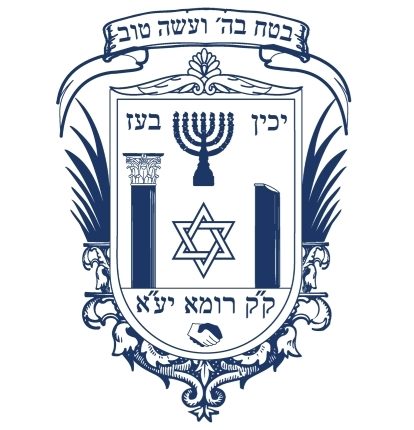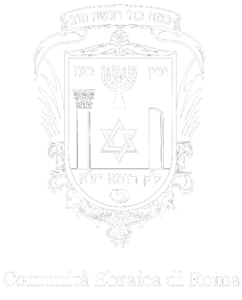Avelut (Mourning)
1) When a person enters a state of agony, it will be their family’s responsibility to recite the prayers prescribed before death.
Family members can ask for the assistance of a Rabbi.
The Rabbinical Office is available for consultation and assistance 24 hours a day, excluding Saturdays and public holidays.
If death occurs on Shabbat or Moed, contact a trusted funeral agency through a non-Jew, also to speed up the burial times.
2) Once death has occurred, relatives who are with the deceased (parents, children, brothers, spouse) will have to make the Keria, which consists, in the event of the death of a parent, in the laceration of the clothes on the left side in correspondence with the heart, each pronouncing the formula “Baruch … Dayan Ha Emet” (Blessed …the Judge of Truth).
In the event of the death of another close relative, laceration will be made on the right side.
If a Rabbi is present, it will be his duty to help the family members provide for this painful ceremony.
Otherwise, it is possible to do the Kerià in the cemetery immediately after the burial.
The clothes with the Kerià must be kept until
the end of the 7th day of Avelut (Shiv’à).
Kerià must not be done on Saturday and Moed.
The death must be immediately notified to the Community (Tel. 06.6840061 – not on Shabbat and Moed).
3) The body must be covered, wrapped in sheets and placed on the ground.
Candles will be lit (not on Shabbat) around the body and a lamp will have to burn continuously until the 7th day of burial is completed in the room where the passing took place.
4) Mirrors will be covered in the room where the body is located.
5) The wake of the dead starts from that moment and is done by the family members who – as tradition prescribes – will read Psalms (in Hebrew or in any other language) until the moment of the funeral.
Relatives will be able to ask the Community for the books to hold the wake themselves or ask for the presence of an authorized guardian.
It is clear that the value of prayers recited by family members is much greater than that of prayers said by another person.
6) For the entire period from death to burial, relatives are Onenìm and can only take care of what is necessary for the funeral, while they are exempt from observing the precepts (Tefillà, tefillin, Birkat ha Mazon, etc.) and do not count for Minian.
7) The body is subjected to Rechizà (ritual washing) and dressed in Tachrichin (a white cloth garment that is supplied by the Community).
The Rechizà is usually performed in the Cemetery, in a devoted room by specialized personnel from the Community (Chevrà Kaddishà).
In particular cases it may be carried out elsewhere, subject to prior notification
and consultation with the Rabbinical Office.
8) After the funeral the Avelut starts and it lasts 7 days (the day of the burial is already considered the first day and the seventh day ends after the morning prayer).
Avelim (parents, children, siblings or spouse of the deceased) are not allowed to work during the seven days of Aveluth.
When returning from the cemetery they will have to eat the meal of Avelut, which will be brought as a gift by another Jewish family, sitting on the ground or on low benches.
This meal consists of bread, boiled eggs, salt and coffee; some add olives and biscuits. The Avelim cannot sit at the table, but must eat seated on their stools for all seven days with the exception of Saturday, when they can regularly sit at table.
If death occurres in the imminence of Pesach, Shavuot, Sukkot, Rosh ha Shanà and Kippur, the count of the days of Avelut changes: it is therefore necessary to contact the Rabbinical Office to find out any variations.
9) The Avelim do not wear Tefillin on the first day of mourning.
10) The Avelim cannot shave for 30 days after the burial; for the parents shaving will be possible on the 31st day and upon invitation from a friend. Thius period cannot be reduced even if there is any celebration ongoing.
11) On the seventh day, on the thirtieth and twelve months after burial, the Avelim will go to the Cemetery to recite the ritual prayers on the tomb of the deceased relative.
It wuld be good to have a Minian in the Cemetery, so that it is possible to say the Kaddish.
12) The Kaddish is to be recited by the Avelim in the year of mourning, during the morning and evening prayers.
According to some, the recitation of the Kaddish stops at the first three weeks of the12th month. The community can be asked to remember the name of the deceased for the entire duration of the year of mourning during daily prayers.
13) Jewish burial is on the ground.
It is strictly forbidden by Jewish law to affix photographs, sculptures and other images to tombstones.
14) During the year of mourning one must not attend or participate in social gatherings or entertainment.
In the event of family or friends parties, it is advisable to contact the Rabbinical Office to find out how to behave.
15) Those who attend the funeral and visit the graves in the Cemetery must have their heads covered.
On Saturdays, High Feasts, Midfeasts, Rosh Chodesh, Chanuccà and Purim, the Cemetery is closed to visitors.
The Community is available to families to provide any help and explanation, and to comfort them
The Community has published the book “Jewish Rules of Mourning” which is given to mourning families and which can also be requested from the Rabbinical Office.
Anniversaries
The first anniversary falls exactly 12 Jewish months from the day of burial.
The following ones fall on the day of death, always according to the Jewish lunar calendar.
If death occurres in the month of Adar in an embolismic year (with two Adar), the anniversary will fall in an embolism year, in that of the two Adar in which the death occurred and in the normal year in the single Adar; if it occurred in a normal year it will always fall in Adar Sheni or in the only Adar.
It is customary to make a limud (study) on occasion
of the anniversary.


